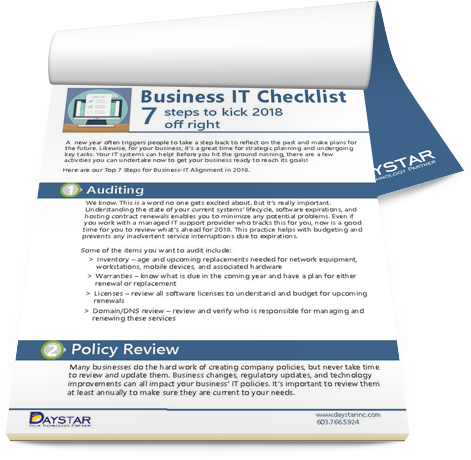A virtual chief information officer (vCIO) is a contracted or outsourced professional who provides high-level IT strategy, leadership, and guidance to an organization. Unlike a traditional CIO, who is an in-house executive, a vCIO operates as a service, typically offered by managed service providers (MSPs).
“A CIO can make an incredible difference, but hiring one full-time is often out of reach for many SMBs. Leveraging an MSP’s vCIO is one of the simplest ways to gain these benefits without the overhead costs of an in-house CIO.” - Keith Bamford, CEO of Daystar.
Generally, a vCIO will cost less than hiring a full-time executive as your in-house CIO. That’s often the reason why many small-and-medium-sized businesses favor virtual CIO solutions over hiring a full-time CIO. However, lower costs shouldn’t mean lower expectations.
This article is here to help you set your expectations. We’ll discuss what vCIO services provide, the key benefits of using them, and how to spot an MSP that will provide high-quality vCIO solutions.
What Does a Virtual CIO Do?
A vCIO focuses on strategic decision-making rather than day-to-day IT operations. They often act as a bridge between technical teams and business leaders. They may also be responsible for vendor management and keeping your IT strategies aligned with technology trends as it suits your business.
25+ Years Serving Clients & 81 Years of Combined Experience
Discover how that level of expertise can enhance your technology usage.
What Are The Benefits of vCIO Services?
1. Proactive Technology Strategies
vCIOs anticipate future technology needs by analyzing trends and assessing your current systems. They develop plans to upgrade outdated technology before it impacts performance or security. With proactive planning, your organization can avoid costly disruptions and maintain competitive agility.
For instance, if you have any customer-facing applications, a vCIO’s advice can help you optimize performance to meet user expectations. Studies show that even a 1-second increase in load time can reduce the percentage of users completing desired actions, such as making a purchase or signing up for a service, by as much as 7%.
2. Cost Management
vCIOs provide detailed budgets that outline where IT resources should be allocated for maximum impact. They identify opportunities to reduce expenses, such as consolidating redundant systems or renegotiating vendor contracts. This approach minimizes waste and enhances cost-effectiveness for your IT investments.
This process involves a thorough evaluation of your IT landscape to pinpoint areas where strategic adjustments can deliver meaningful results. The table below breaks down the key components of this assessment and the specific benefits each provides.
|
Details |
Outcome |
|
|
IT Resource Allocation |
Analyzes current IT resource usage to determine optimal allocation for business needs. |
Improved resource efficiency and strategic alignment. |
|
Expense Reduction |
Identifies opportunities to cut costs, including system consolidation and contract renegotiation. |
Lower operational expenses and streamlined processes. |
|
Redundancy Identification |
Reviews systems and software to eliminate overlaps and inefficiencies. |
Simplified IT environment and reduced maintenance costs. |
|
Vendor Contract Review |
Assesses vendor contracts to negotiate better terms or identify alternative solutions. |
Improved cost-effectiveness and vendor management. |
|
Budget Planning |
Develops a detailed budget outlining prioritized IT investments. |
Enhanced financial planning and predictable expenditures. |
3. Improved Security Posture
vCIOs analyze your IT infrastructure to identify weaknesses that could expose your organization to threats. They implement advanced security measures, such as multi-factor authentication and real-time monitoring tools, to minimize risks.
These measures make it easier to patch previously undetected vulnerabilities. That’s a major advantage when you consider that 80% of cyber attacks utilized vulnerabilities that had been present for 3 or more years.
4. Increased Productivity
vCIO services identify inefficiencies in your IT systems and recommend practical solutions to eliminate them. They improve workflows by integrating tools that enable smoother collaboration and data sharing. These optimizations empower your team to focus on their tasks without unnecessary technical interruptions.
5. Access to Expertise
vCIOs bring deep technical knowledge and business acumen to your organization. They provide actionable advice on emerging technologies and how they can enhance your operations. Their experience helps you make informed decisions.
|
Get More Strategic IT Advice at Our Learning Center |
How to Spot an MSP With High-Quality vCIO Services
1. Ask Your Potential MSP How They Pay Their vCIOs
You don’t need to ask how much they get paid, but you do need to know how they are compensated. The reason why you need to know that is because many vCIOs work off commissions. That means that they may make recommendations to make a sale, not to help you meet your business goals.
If the MSP isn’t willing to provide that information, ask them why. If they’re still dodging the question, avoid that MSP. A lack of transparency is a sign of other problems as well.
2. Insist on Customized IT Solutions
Ask how the vCIO tailors IT recommendations to your specific needs. A one-size-fits-all approach often leads to wasted resources and poor results. The vCIO should take the time to learn about your business and provide solutions that are aligned with your business.
If they push generic recommendations or fail to explain how their solutions fit your needs, this shows a lack of genuine interest in your success. True customization reflects a commitment to partnership and long-term value.
3. Ask About Employee Training & Support
Find out if the MSP’s vCIO includes employee training in their services. Training ensures your team can use new tools effectively and maintain cybersecurity. For instance, CloudSecureTech reports that 80% of companies who invest in security awareness training noticed a significant reduction in their employees’ susceptibility to phishing scams.
Furthermore, offering this service also demonstrates the MSP’s investment in your overall success, not just their own deliverables.
4. Verify Their Transparency With IT Budgets
Ask the MSP how their vCIO handles IT budgeting. They should help you understand where your money is going and how their recommendations fit into your overall financial strategy. A transparent budgeting process ensures there are no hidden fees or unexpected expenses.
If the MSP hesitates to provide clear answers, this is a sign of poor financial accountability. Look for a partner who values transparency as much as you do.

5. Ask How Often The vCIO Will Conduct Performance Reviews
Ask your MSP how often their vCIO conducts IT performance reviews and what insights they provide. Regular reviews ensure that your IT systems remain efficient and aligned with your goals. They also help identify potential risks or inefficiencies before they become major problems.
If the MSP cannot provide a clear schedule or examples of past reviews, consider this a red flag. Performance metrics are key to measuring the value of your IT investments. An MSP unwilling to share this information may not prioritize your success.
6. Analyze Their Strategic Planning Process
Working with you to help you create your long-term technology roadmap is one of the primary duties of a vCIO. So, it’s not enough to ask whether or not they will do this work. Instead, analyze how they perform the process.
A vCIO should take the time to understand your company’s goals before suggesting changes. Pushing changes before they’ve looked at your IT systems is a sign they’re just trying to make a sale. If they cannot explain how their recommendations will benefit your business, they’re not aligned with your needs.
|
Discover The Difference That New England’s Top IT Consultants Can Make |
|||
Choose an MSP Who Prioritizes Your Business Objectives
Now that you know what to look for in a vCIO, your next step is to find an MSP who fits this description. Doing your research takes some time and effort, but you can quickly find your ideal vCIO at Daystar.
Our vCIOs are strategic business analysts. They will be dedicated to your specific account and focus solely on your needs. We don’t use a commission-based system to incentivize our vCIOs; we want them to offer real value, not simply as many sales as possible.
Reach out today to learn more about us.












